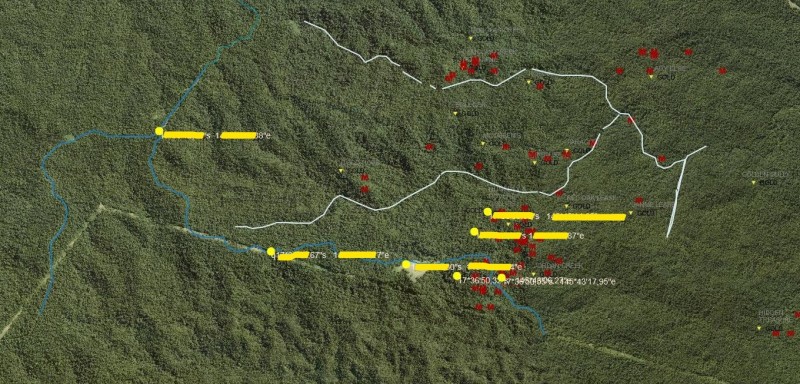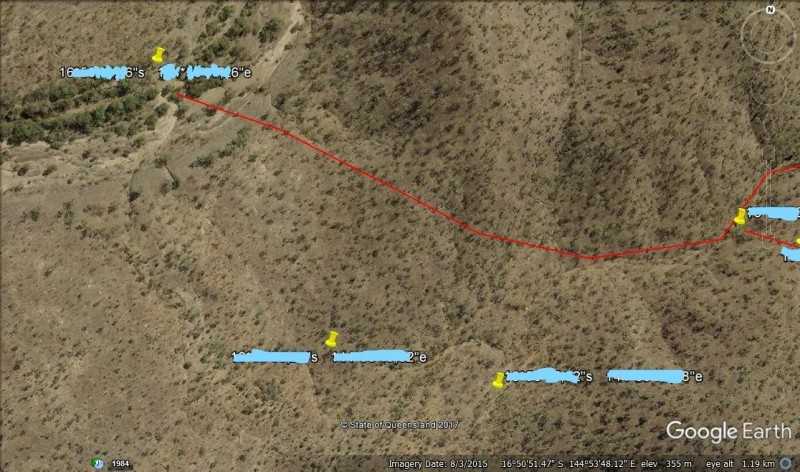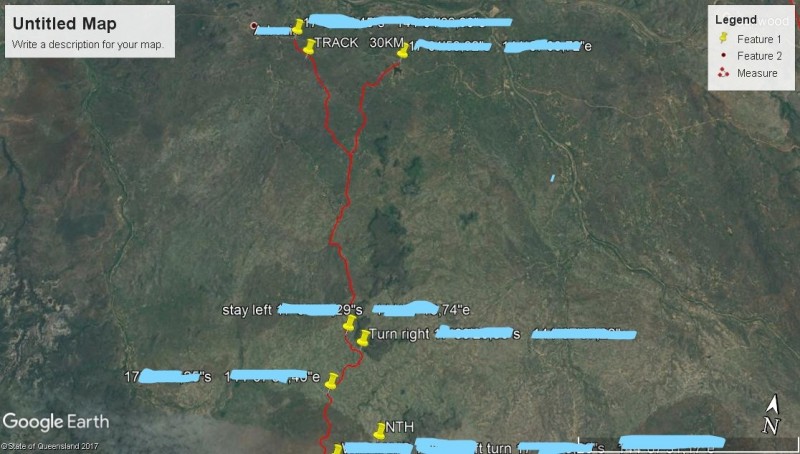-
Posts
32 -
Joined
-
Last visited
Content Type
Forums
Detector Prospector Home
Detector Database
Downloads
Everything posted by Joe76
-
In FNQ Australia, there are a number of properties you can go on & detect for gold. Most places are pay to detect & are well set up for camping with designated areas set aside for metal detecting, if you are fortunate enough to have access to private leases & cattle stations with gold bearing country even better again. Up until today, I had access to one of these private cattle stations to prospect on. Unfortunately I no longer have access, this is due to the fact there are still people doing the wrong thing while on these properties. The rubbish left behind at camp sites and open detector holes for cattle to break legs in is out of control. On top of that you got fence jumpers & poachers running a muck too. This is causing huge issues for for graziers forcing them to close the gates to everyone & in most cases getting access now, is nearly impossible. I can't express in words how disappointing this is for us guys & girls who are doing the right thing, only to be told you can't detect at your favourite spot anymore because of w#%kers ruining it for everyone. So the quest for a new spot starts again.... Take only gold and memories & leave only foot prints. So we will all have somewhere to look for gold in the future!
-
I remember gold being around the $500 mark before I got into detecting, we use to sluice all week just making enough to keep going. On one trip my prospecting mate thought he could make more money if he smelted his gold he found that week to make fake nuggets. It ended in disaster, he poured the gold into a jar of water & it exploded on him. I had tears rolling down my face from laughing so hard, but unfortunately for old mate we never found his gold... none of us owned a detector at the time!
-
The new flat wound coils can start to play up on hot days as the ground heats up, I found that out while detecting on days with a temp range in the mid 30's where at times I had revert back to standard coils for the hottest part of the day. The 14 Elite is a great coil just like nugget finder Evo coils but with the advantage of a pressure release valve to help combat hot conditions. If the gold tends to be smaller like you mentioned under 5 grams with shallower ground, the 12" evo would be my pick on the Gpx.
-
Gees those fellas put in a lot of work raking & clearing that site, you need a lot of patience to do that sort of detecting.
- 16 replies
-
- 1
-

-
- minelab gold monster
- minelab equinox
-
(and 1 more)
Tagged with:
-

Woody Detector Mods - Are These Legit or Bogus?
Joe76 replied to jasong's topic in Minelab Metal Detectors
Personally I wouldn't get a gpx modified, based on price for upgrading towards a Zed or even a good second hand one would seem more logical. My brother actually forked out $1200 to get his sd2200d modded many years ago & yes there was a marked improvement especially the gain mod.This helped with using mono coils, but still I couldn't justify the cost myself. I had owned a modded gp3000 done by Woody which I picked up for less than the price for a stock secondhand gp3000 . The person who paid for it to be modded lost out on that detector big time & that's something to think about if your considering going down that road with modding. I had an opportunity to test a modded gpx4500 in the field one time, Mount Mulligan actually & this detector had some real issues going on. I'm not sure what was wrong with it but the gentlemen who owned it wasn't a happy camper. No matter what i did i couldn't get it to settle down, even to a point by dropping the gain & stabiliser right down made little difference. This isn't to say there isn't any good modded gpx's out there, just that this gpx4500 most certainly wasn't one of them. If I was going to get my 3500 modded It would be done by Ismael Jones & done for less than the cost of a new coil! -
G'day, I Just bought a Detech 8" dd coil from you today, I will be keen to see how it goes on the 35, if I can run it in mono over my patch that will be a bonus. One thing I have noticed with the signal control on the 35 is how the threshold behaves from anti clock wise to full clock wise position. At the full signal position the detector seems to be smoother & quieter than opposite position where the threshold volume appears to sound louder with less stability. Why the target response is reduced is obvious but the instability with the signal control wound back makes no sense to me. I found If I run the signal back a touch from max & lift the threshold a little it purrs along nicely without going into overload when retrieving targets.
-

A Little One That Almost Got Thrown Away
Joe76 replied to phoenix's topic in Detector Prospector Forum
Gold is gold, nice pics very sharp images. I almost did the same thing to a 5 gram nugget it was completely encrusted in iron stone. Just looked like a rusty nugget almost tossed thinking it was a little hot rock until I gave it a scratch. Makes you wonder how many nuggets have been kicked out of the way. -
Hey thanks, Nenad. I will give that a go for sure. I've never used salt timing before so It will be interesting to see how it handles the ground That maybe the problem the soil maybe be high in salt. As a interesting note the ground was once the ocean floor so that would make sense. Some people on hear maybe familiar with the area it's a town called Chilligoe west of Cairns NTH QLD it's not known for gold so much as it is mostly marble & granite country with high limestone bluffs scattered across the landscape & if your into exploring caves there's some really deep ones. Anyways I'll give that a crack, it will be good opportunity to test the NF 25" dd against the 15" dd ultimate Cheers, Joe
-
Great explanation, the gp3500 is still a very good detector along with the earlier models such as the sd2200. I remember a trip to Flat creek station in 2009 near George town NTH QLD. The camp site was full & there were plenty of Gpx 4500's & 4000's being used. I was the only one there with a Sd2200. After setting up camp & introducing my self with some of the prospectors It became apparent that nobody had found any gold in days, this was certainly discouraging for me that I was about to start detecting with a Sd2200 over where 4500's had already been hammering. But after driving nearly 7 hours to go prospecting I wasn't about to give up that easily. So I threw on my harness and headed west straight through the main diggings going towards the Gilbert River, in the hope of finding ground out that might give up a nugget here & there. Well I only made it 50m from camp when I got a soft signal through my earphones, I don't know how deep it was, but it was a 9 gram nugget at good depth. I was very surprised considering there were so many gpx detectors flogging this area for days. It wasn't until a couple of years later I realised why nobody had found that nugget before i did & I think it came down to the fact most were probably using smooth timings to quieten the ground down and the nugget I found was just out of reach for the newer machines. The Sd2200 with no choice but the more powerful normal timing, was punching deeper on the bigger solid bits at depth. As soon as i found that nugget I walked straight back to the camp site to show everyone what i just found with the 2200, I don't think too many were very impressed with me lol. But it just goes to show how good the older machines still are, especially the Gp3500 if your willing to put the time in.
-
It's not a Chinese copy is it?
-
What I found with the mapping software on QLD derm site, not all mines & mining activity is recorded and documented which is understandable. I found some nice spots reading through books like ghosts & gold & Cape York gold 'The new chum' amongst others & a lot of information which isn't documented on any maps. Using the mapping software allows me to locate these little areas with pretty good accuracy & possible access routes into these spots using the google earth feature. Half the fun is researching & planning new gold prospecting trips with the possibility of no modern detectors having been there before. It pays off for me nearly every time I can't recommend it enough. I've included a couple of screenshots from the QLD mining website if anyone is using it.
-

Nugget Finder 12 X 8 Evolution Coil For GPX In August 2018
Joe76 replied to roddosnow's topic in Minelab Metal Detectors
Hi Phrunt, how is the (12x6 x coil) going for you? -

Makro Gold Kruzer First Look Video
Joe76 replied to PhaseTech's topic in Nokta / Makro Metal Detectors
Thanks for all your input guys, I thought that might have been the case over hot ground. That said it still looks like one of the best VLF gold detectors around $1000 mark. -
That is excellent, thanks for the link I'll check it out. GIS sounds like the bee's knees, having more tools at your disposal is worth its weight in gold especially accessing remote areas. Cheers Joe
-
Your welcome Phrunt, It took me 3 weeks just to learn how to navigate the QLD DERM website page. I was amazed at the information available once I got the hang of using it, I assume in NZ has something similar. One thing that caught my eye was pending mining leases & EPM's that are marked out & going through the approval process. I would see which company had the proposed EPM & do research about them on the net to find out what they were chasing & if they had any potential gold exploration sites pending as they have already done the research on the area for you! Most Gov mining sites have interactive mapping system such as Google Earth, with operational layers for an overlay of current mining activity, historical, geological, claims, pending EPM's & leases.
-
G'day everybody, Just thought I would start a thread on making your own gold maps to better your chances at striking it rich or at least finding a bit of gold. If this topic has already been done before please let me know & I'll remove it. I can't find anything specific on making your maps on the forum. So what are the things available for us to use in making custom gold maps? Geological maps, topographical maps, books such as Ghost & gold series, Department of mining websites, google earth etc...there is plenty of resources that we can use. I live in sunny north QLD Australia, so any info I can share with you will be based on what we have available in our QLD. Every state in Australia has its own mining department along with (rules and regulations) that differ from state to state. Department of Mines & Energy in QLD is the website I use to gather a lot of information, so far it has paid out very well in some areas. In particular small isolated gold occurrences. I often look around the fringes of existing gold fields looking for potential gold locations especially along fault lines with historical gold workings. The more remote the area the better, as there are fewer chances of modern detectors having worked the area in recent years. To get the ball rolling I thought I would just post a couple of pics of areas I have researched & marked out where I've found gold & see where it leads us.
-

Makro Gold Kruzer First Look Video
Joe76 replied to PhaseTech's topic in Nokta / Makro Metal Detectors
Lots of good info as always & like my self and many others, I think it's fair to say we all appreciate the effort by the pros gone into testing new machines like the Gold Kruzer and many others. There have been some really good reports coming in over the last year on the Gold Kruzer proving it is a hot little gold detector used in the right areas. It would be nice to know how good the Gold Kruzer is at detecting gold through moderately mineralised soils, we always had our Garrett at Gold with us when sluicing out rock bars & using it to check over cracks & crevices for nuggs that might have been missed by hand. One thing that didn't impress me about the AT gold was the significant loss of depth in mineralised ground, air tests on small nuggets and in mild ground had decent results. We carried out the same tests in hotter ground & some cases the test pieces were basically ignored buried just under the soil which was probably masked by the iron rich dirt. This isn't to say the AT gold wasn't behaving itself over the warmish ground it actually sounded smooth, it just had trouble seeing the gold that was obviously masked by the mineralisation. I suppose my question is has Makro improved the performance in the Gold Kruzer to better penetrate hot ground where other VLF detectors have struggled. Anyone that would like to chime in on the depth capabilities of the Gold Kruzer or just want to share their experiences with it please do so. I'm located in NTH QLD Australia our ground here is moderately mineralised in most places. Cheers. -
Hi Nenad, I have a question about running a gp3500 in tracking, I have a patch I found some years ago when I was using my gpx5000 with some really nice gold coming off it, like the 2 ounce bit in my profile pic. The ground is so hot and variable that enhance & fine gold struggled even dialling down settings. A took a mate out there just for a day so he could find a bit with his ZED & it too had trouble over the same ground having to drop sensitivity right back to try & cope. I haven't encountered groud like it before. Since then I sold my 5k through not being able to get out and use it but still own a gp3500. Now I am back on the hunt again, I was wondering if you had any experience using a gp3500 running in tracking using a DD coil opposed to fixed & if this may work in this situation as this ground seems to be nearly impossible to work at times. I did some tests with a 0.3 piece using my Detech 15" spiral dd running in tracking & what I found I couldn't track out the nugget in dd mode. I'm yet to test my Detech 11" spiral mono using tracking. But I am hopeful over this super hot ground the gp3500 may have a chance if I can use tracking using a dd coil. If you have any advice you could share with me using the 35, it would be much appreciated. Cheers Joe





